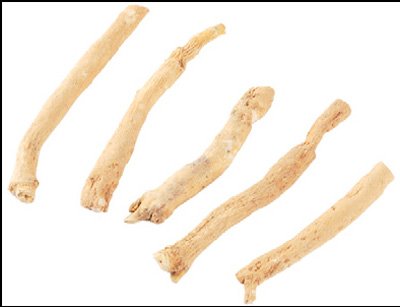Ashwagandha
Ayurvedic Medicine

Ashwagandha
Winter cherry (E), Indian ginseng (E), Asgandh (H):
The irony of ashwagandha is that it is a tonic and sedative all in one. It strengthens an exhausted nervous system that can manifest with 'hyper' signs such as emotional instability, agitation or feeling stressed out. It has the dual action of energising while calming. Its name ashwagandha meaning 'the smell of a horse', comes from the smell of the fresh root (like horse's urine), and also perhaps because it is renowned for imparting the sexual stamina of a horse.
Tissues Debility, low body weight, emaciation, deficient haemoglobin, anaemia, post-convalescent weakness, athletic exertion and with caution in pregnancy. It is useful for any imbalance in the muscles as it both reduces inflammation and strengthens muscle tone. It is a specific rasayana for mamsa dhatu and it is an anabolic muscle builder (Caraka, Bhavapraka´sa, Venkataraghavan et al 1980). As it benefits all muscle tissue it is used as a heart tonic, uterine tonic, and a lung tonic, as well as for increasing muscle weight and tone in convalescents, slow-developing children, and the elderly. Immunity Autoimmune conditions, neutropenia, rheumatoid and osteoarthritis, cancer, and chronic connective tissue disorders. As a painkiller and antiinflammatory it is commonly used in swollen or painful arthritic conditions. It can strengthen a weakened immune system and protect it from becoming depleted due to immunosuppressive drugs or lifestyle. Improves white blood cell counts. It appears to have both immunosuppressive and immunotonic abilities and is therefore a 'true' adaptogen. Lungs Asthma, cough and allergic conditions from low immunity with high kapha and vata. Useful in hayfever, allergic rhinitis from aggravated vata and kapha. Nerves Neurosis, insomnia, anxiety, excessive thinking, 'hyper' symptoms and attention deficit and hyperactivity disorder (ADHD). Very useful in all conditions caused by 'stress' as it has a specific affinity for the majja dhatu and helps to regulate the movement of vyana vayu in the heart. Its tropism for the nervous system benefits multiple sclerosis. It both relaxes frayed nerves and tonifies the central nervous system to enhance tolerance to stress. It is a nourishing nevine as opposed to a heavy sedative. Reproductive Its rejuvenating effect on s´ukra dhatu helps to alleviate asthenospermia (increasing sperm motility), oligospermia (increasing sperm count), and poor sexual performance, and helps to reduce impotence. Its unique action or prabhava is to promote sexual potency and sperm production. External application of ashwagandha oil is used for impotence. Gynaecology Excellent tonic to the uterine muscles. Used in menstrual imbalance caused by a deficient condition with an aggravation of vata and uterine spasms; dysmenorrhoea, amenorrhoea, weakness. Thyroid Very useful in hypothyroid disorders to regulate thyroid activity.
 Mint
Mint Gurmar
Gurmar Trivrut
Trivrut Hemp Seed
Hemp Seed Shilajit
Shilajit Karavella
Karavella Krishna Jiraka
Krishna Jiraka Frankincense (Indian)
Frankincense (Indian) Coriander
Coriander Shankhapushpi
Shankhapushpi Kushtha
Kushtha Daruharidra
Daruharidra Test your English Language
Test your English Language  Tips to get ready for Party
Tips to get ready for Party Interior Essentials
Interior Essentials Abraham Lincoln
Abraham Lincoln Dussehra Celebration
Dussehra Celebration Road Safety Tips
Road Safety Tips Crazy Facts
Crazy Facts Healthy Hair
Healthy Hair Best Cities for young People
Best Cities for young People Best Cricketer
Best Cricketer




